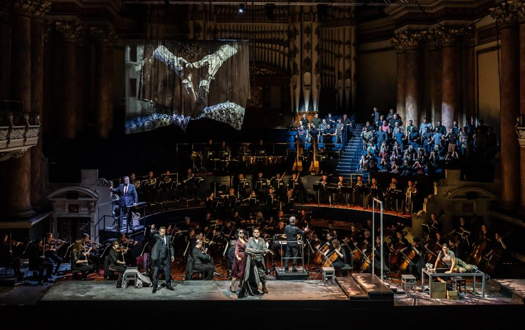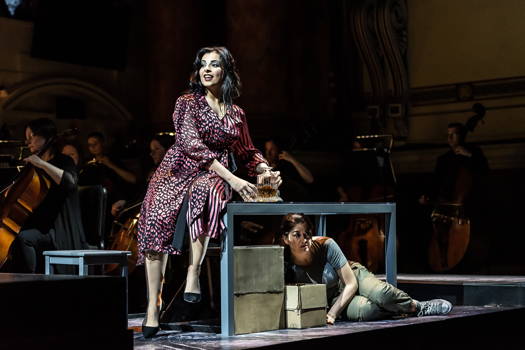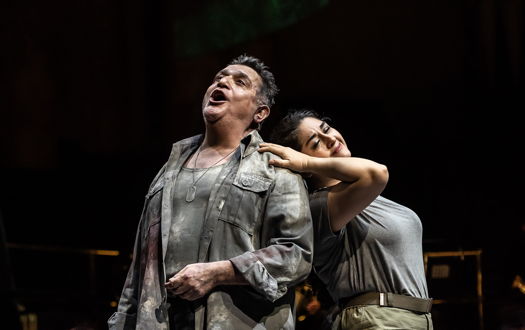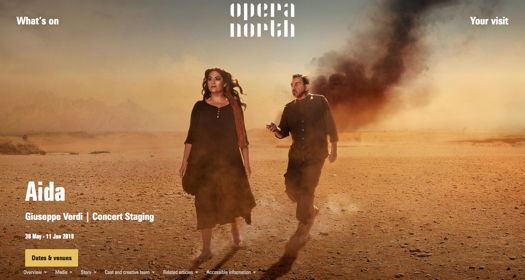 CENTRAL ENGLAND: Mike Wheeler's concert reviews from Nottingham and Derbyshire feature high profile artists on the UK circuit - often quite early on their tours.
CENTRAL ENGLAND: Mike Wheeler's concert reviews from Nottingham and Derbyshire feature high profile artists on the UK circuit - often quite early on their tours.
- Gladys Maria Nockin Chandler
- zither
- David Mayer Epstein
- Cortot
- Majer
- Luigi Dallapiccola
- Christmas Eve
- J'Nai Bridges
 DISCUSSION: What is a work? John Dante Prevedini leads a discussion about The performing artist as co-creator, including contributions from Halida Dinova, Yekaterina Lebedeva, Béla Hartmann, David Arditti and Stephen Francis Vasta.
DISCUSSION: What is a work? John Dante Prevedini leads a discussion about The performing artist as co-creator, including contributions from Halida Dinova, Yekaterina Lebedeva, Béla Hartmann, David Arditti and Stephen Francis Vasta.
Nothing but Praise
Opera North's concert-staged 'Aida',
reviewed by MIKE WHEELER
Usually, I'm a big Verdi fan, but Aida has never been one of my favourites. The humanity that makes a work like Falstaff or Un Ballo in Maschera tick always seems here to be swamped by the spectacle, and I suspect that, at some level, Verdi's heart wasn't fully engaged.
In the latest of Opera North's series of concert stagings of big-scale works, Annabel Arden's direction, using a narrow acting area in front of the orchestra, focused our attention on the main characters, while conductor Richard Armstrong backed Verdi up in keeping the action moving swiftly, with Opera North's chorus and orchestra on superb form - Royal Concert Hall, Nottingham, UK, 15 May 2019.
Video imagery - designed by Dick Straker and directed by Joanna Parker, who also designed the staging - was seen not on the digital screens that served the Opera North Ring cycle so well, but projected onto a large cloth roughly draped over a frame suspended above the orchestra.

Michael Druiett as The King of Egypt, Petri Lindroos as Ramfis, Alessandra Volpe as Amneris, Rafael Rojas as Radamès and Alexandra Zabala as Aida with the Chorus and Orchestra of Opera North in Verdi's 'Aida'. Photo © 2019 Clive Barda
Amid footage of war-shattered buildings, and close-ups of slowly moving feet and hands, came an even more telling image - at the end of Act I, synchronised with the climactic call to the god Fthà, was a woman's face clearly crying out in desperation.
Alexandra Zabala gave Aida both strength and fragility, fining her tone away to a delicate thread at the end of 'Ritorna vincitor!', and finding depths of sorrow in 'O Patria Mia' in Act III, floating effortlessly up to the top A on 'ti rivedrò'.
Alessandra Volpe's dark-voiced Amneris was a manipulative good-time girl oozing insincerity and shallow sophistication, but finding a convincing level of remorse as Aida and Radamès went to their deaths at the end.

Alessandra Volpe as Amneris and Alexandra Zabala in the title role of Verdi's 'Aida' for Opera North. Photo © 2019 Clive Barda
Rafael Rojas, Opera North's go-to tenor for heroic Italian roles, had all his usual strengths of clear, ringing tone as an obviously conflicted Radamès. He returned from his defeat of the Ethiopians in the last scene of Act II not triumphant, but wearily dragging behind him the battle-standard he was presented with before he left, and which he sat cradling disconsolately in the midst of the victory celebrations. He may have won the battle, but he had lost everything else, and it threw into relief the hollowness of the public posturing that surrounded him.

Rafael Rojas as Radamès with Alexandra Zabala in the title role of Verdi's 'Aida' for Opera North. Photo © 2019 Clive Barda
As Amonasro, the defeated Ethiopian king and Aida's father, Eric Greene was just as manipulative as Amneris, but clearly realised he had gone too far in using his daughter to tempt Radamès into revealing the secret route of his army's fresh attack the following day.
The principal roles were complemented by Petri Lindroos as a black-toned High Priest, Ramfis, and Michael Druiett's aloof, impersonal King of Egypt.
So while I remain sceptical about the opera itself, there can be nothing but praise for Opera North's performance and staging, and its refusal to have any truck with Cecil-B-de-Mille-style trappings.

A publicity image for Opera North's 'Aida'
Pyramids and sand - who needs them?
Copyright © 29 May 2019
Mike Wheeler,
Derby UK



